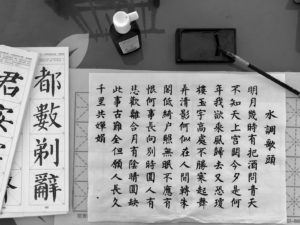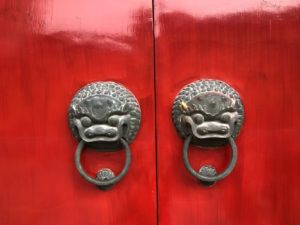
Konnichiwa! I'm Mami, a trilingual girl in Japanese, English and Chinese.
I will write about why I quit my job at the end of my twenties to study in China, how I obtained HSK level 6 in my two years, and my life in China.
For working people who want to study abroad after quitting their jobs, studying in China is a big investment in terms of time and money.
Therefore, I hope that this article will be useful information for readers who are considering studying in China.
Contents
First of All

In my 20s, after Graduating from Tokyo University of Foreign studies, I tried to improve my English skills by working as an English teacher & English-Japanese translator.
In order to become an interpreter who does not depend on organizations and can earn a certain amount of money, I spent my days attending an interpreting school on weekdays and studying languages on weekends.
On the surface, I seemed to be a serious and highly motivated worker, but inside, I was very tired of my life only full of English.
At the same time, I was involved in harassment at my company and found it difficult to stay at work.
I didn't have the skills and experiences to change jobs, and I didn't have a place to stay in my workplace.
Suddenly my life got stuck.
It was my father-in-law who gave me a hand to save me.
He gave me the opportunity to study in China to think about my life again.
In this article, I would like to tell you about my study-abroad experiences in Beijing from the fall of 2014 to the summer of 2015 at Tsinghua University.
1st Year at Tsinghua University

The Chinese classes at Tsinghua University were roughly divided into three levels (beginner, intermediate, and advanced), and each level was further divided.
For example, there are three intermediate classes: semi-intermediate, intermediate 1, and intermediate 2, with intermediate 2 being the most difficult of the intermediate classes.
I, who came to study in China with zero Chinese language ability, got a semi-intermediate level in the result of the class placement test.
At first I thought it was some kind of mistake, believing I should be in the beginner class, but I was relieved to hear the beginner's class is a class where students from non-kanji (Chinese characters) countries learn to read and write kanji (Chinese characters)".
Having said that, the intermediate level is the level at which students from non-Chinese speaking countries have studied Chinese continuously for more than a year, and especially students from Europe and the United States already had a certain level of listening and speaking skills.
What would happen if a Japanese student who can read kanji and has no listening/speaking skills, and students who can't read much kanji and have good listening/speaking skills, were lumped together in a semi-intermediate class?
I didn't understand what the Chinese teacher was saying at all, so I had nothing to do but read the textbook (in Chinese and its English translation) in class.
I didn't know what the homework was, so I asked the teacher after class in English, but since there were not many Chinese teachers who were fluent in English, they didn't understand me very well.
Ironically, I had a lot of time to myself in reading class as I can read kanji.
The hardest part is the speaking class.
The purpose and motivation of foreign students who come to study Chinese vary, but especially those who come to study here after quitting their jobs, like me, are very serious.
They may not have the time & money to spare, so they are on edge trying to get the most out of their performance in a short period of time.
When it comes to speaking pairings with such classmates, there were times when they sent a nasty look at me.
Sometimes I was explicitly told by my classmate that he wanted to be paired with another classmate.
It's a very reasonable reason that he didn't want to practice speaking with me who can't speak and can't hear Chinese, and I don't want to criticize him.
I was just miserable because of my poor Chinese skills.
Therefore, I tried my best to improve my listening and speaking skills at a rapid pace.
I got up at 6:00 a.m. and read the textbook aloud while listening to the attached CD.
Although the content was similar to that of elementary school students, such as self-introduction and how to ask for directions, I struggled very hard.
My ordinary day went like this; after finishing Chinese classes in the morning, from afternoon to evening I spent time in review & preparation.
With this style of living, I completed six months of the semi-intermediate classes.
I improved Chinese skills to the extent that I could communicate with my classmates in Chinese, but listening and speaking still remained a challenge.
It was around this time that I passed the HSK 6th level for the first time.
For the next six months, I was in the Advanced 1 class.
In the semi-intermediate class, most of the classes were taught by veteran teachers in their 40s, but in the advanced 1 class, many of the them were young interns enrolled in graduate school, and classmates complained about the decline in the quality of the classes.
In addition, it would be difficult to improve my speaking skills in a group class of about 25 students, so I began attending a cram school outside the school.
It was a reasonable class size with one Chinese teacher and three international students, and as far as I remembered, it was about 1500 yen (about 15 dollars) per hour (in 2014).
She was a veteran teacher with high teaching ability.
Although I was a little dissatisfied with my classes at Tsinghua University, I was blessed with good classmates and was able to enjoy my student life outside of my studies.
Mami's Chinese Skills (1st Year in Beijing)

My Chinese language proficiency in the first year of my study abroad is as follows.
- Passed HSK level 5 (3 months after studying abroad)
- Passed HSK level 6 (6 months after studying abroad)
Japanese students around me (mainly working people) also passed the HSK level 6 in 6 months to 1 year, so I improved my Chinese skills at an average speed.
By the way, just because I passed HSK level 6, that didn't mean at all that I got fluent in Chinese.
In fact, it didn't happen that I could understand most of the native Chinese speakers, or that I could say what I wanted to say.
Despite my Chinese skills dramatically improved during the 1st year in Beijing, I was still struggling in listening and speaking.
When I was about to enter my second year of study abroad, my original goal of obtaining a qualification (passing HSK level 6) had already disappeared.
Therefore, I had to decide my goal by my self and how to achieve it (including whether it is necessary to study abroad for two years or not).
Others

Basically, I spent stoic days ; dormitory (morning), classes (morning), cafeteria (noon), dormitory (afternoon), cafeteria (evening), and dormitory (night).
However, I met many people of different nationalities and ages through the following holidays and opportunities.
- National Day (October) : Travel to Inner Mongolia with Japanese company-sponsored students
- Chinese New Year (late January) : Chinese New Year is celebrated in Beijing
- Japanese language teacher : I taught Japanese once a week to a Chinese university student
Lastly, but not least

If your purpose of studying Chinese is to obtain HSK level 6, a minimum of 6 months is sufficient for Japanese.
In the sixth month to the first year of study, my Chinese language skills improved further, but I don't have a suitable qualification to prove this improvement (Passing the "HSKK (Speaking) Advanced" is too difficult at this stage).
You can increase the overall score of HSK6 (since it is said that more than 180 out of 300 points are acceptable), but the cost-effectiveness is quite subtle (few people can understand the difference between 180 points of HSK6 in 6 months and 210 points of HSK6 in one year).
Therefore, I decided to spend my second year in Beijing with the goal of creating points of appeal other than Chinese qualifications.
I'd love it if you could follow me on Twitter.